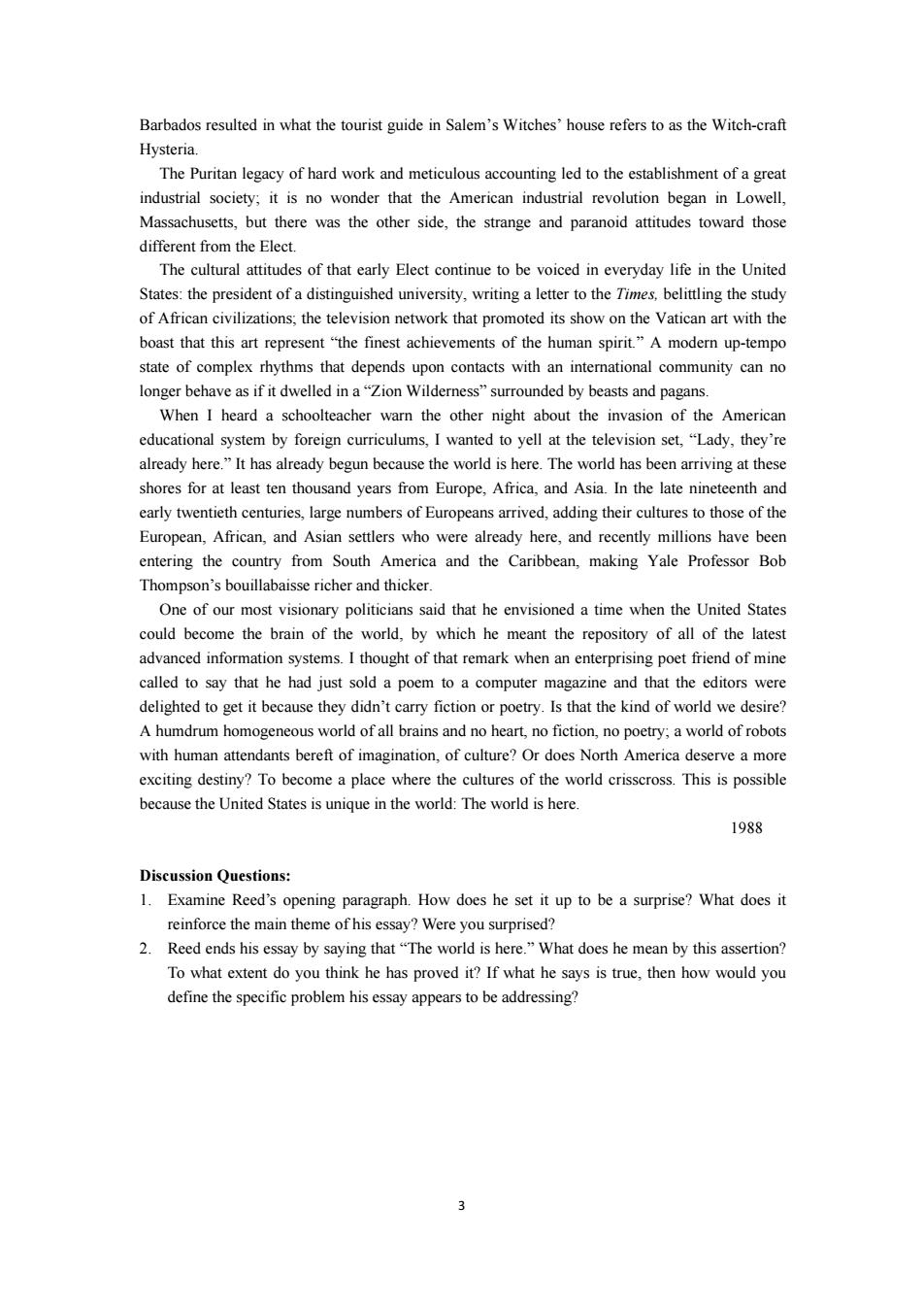正在加载图片...

Barbados resulted in what the tourist guide in Salem's Witches'house refers to as the Witch-craft Hysteria. The Puritan legacy of hard work and meticulous accounting led to the establishment of a great industrial society;it is no wonder that the American industrial revolution began in Lowell. Massachusetts,but there was the other side,the strange and paranoid attitudes toward those different from the Elect. The cultural attitudes of that early Elect continue to be voiced in everyday life in the United States:the president of a distinguished university,writing a letter to the Times,belittling the study of African civilizations;the television network that promoted its show on the Vatican art with the boast that this art represent "the finest achievements of the human spirit."A modern up-tempo state of complex rhythms that depends upon contacts with an international community can no longer behave as if it dwelled in a"Zion Wilderness"surrounded by beasts and pagans. When I heard a schoolteacher warn the other night about the invasion of the American educational system by foreign curriculums,I wanted to yell at the television set,"Lady,they're already here."It has already begun because the world is here.The world has been arriving at these shores for at least ten thousand years from Europe,Africa,and Asia.In the late nineteenth and early twentieth centuries,large numbers of Europeans arrived,adding their cultures to those of the European,African,and Asian settlers who were already here,and recently millions have been entering the country from South America and the Caribbean,making Yale Professor Bob Thompson's bouillabaisse richer and thicker. One of our most visionary politicians said that he envisioned a time when the United States could become the brain of the world,by which he meant the repository of all of the latest advanced information systems.I thought of that remark when an enterprising poet friend of mine called to say that he had just sold a poem to a computer magazine and that the editors were delighted to get it because they didn't carry fiction or poetry.Is that the kind of world we desire? A humdrum homogeneous world of all brains and no heart,no fiction,no poetry;a world of robots with human attendants bereft of imagination,of culture?Or does North America deserve a more exciting destiny?To become a place where the cultures of the world crisscross.This is possible because the United States is unique in the world:The world is here. 1988 Discussion Questions: 1.Examine Reed's opening paragraph.How does he set it up to be a surprise?What does it reinforce the main theme of his essay?Were you surprised? 2.Reed ends his essay by saying that"The world is here."What does he mean by this assertion? To what extent do you think he has proved it?If what he says is true,then how would you define the specific problem his essay appears to be addressing?3 Barbados resulted in what the tourist guide in Salem’s Witches’ house refers to as the Witch-craft Hysteria. The Puritan legacy of hard work and meticulous accounting led to the establishment of a great industrial society; it is no wonder that the American industrial revolution began in Lowell, Massachusetts, but there was the other side, the strange and paranoid attitudes toward those different from the Elect. The cultural attitudes of that early Elect continue to be voiced in everyday life in the United States: the president of a distinguished university, writing a letter to the Times, belittling the study of African civilizations; the television network that promoted its show on the Vatican art with the boast that this art represent “the finest achievements of the human spirit.” A modern up-tempo state of complex rhythms that depends upon contacts with an international community can no longer behave as if it dwelled in a “Zion Wilderness” surrounded by beasts and pagans. When I heard a schoolteacher warn the other night about the invasion of the American educational system by foreign curriculums, I wanted to yell at the television set, “Lady, they’re already here.” It has already begun because the world is here. The world has been arriving at these shores for at least ten thousand years from Europe, Africa, and Asia. In the late nineteenth and early twentieth centuries, large numbers of Europeans arrived, adding their cultures to those of the European, African, and Asian settlers who were already here, and recently millions have been entering the country from South America and the Caribbean, making Yale Professor Bob Thompson’s bouillabaisse richer and thicker. One of our most visionary politicians said that he envisioned a time when the United States could become the brain of the world, by which he meant the repository of all of the latest advanced information systems. I thought of that remark when an enterprising poet friend of mine called to say that he had just sold a poem to a computer magazine and that the editors were delighted to get it because they didn’t carry fiction or poetry. Is that the kind of world we desire? A humdrum homogeneous world of all brains and no heart, no fiction, no poetry; a world of robots with human attendants bereft of imagination, of culture? Or does North America deserve a more exciting destiny? To become a place where the cultures of the world crisscross. This is possible because the United States is unique in the world: The world is here. 1988 Discussion Questions: 1. Examine Reed’s opening paragraph. How does he set it up to be a surprise? What does it reinforce the main theme of his essay? Were you surprised? 2. Reed ends his essay by saying that “The world is here.” What does he mean by this assertion? To what extent do you think he has proved it? If what he says is true, then how would you define the specific problem his essay appears to be addressing?